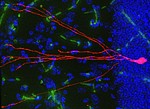Bridging Brain Barriers
Group Members
Prof. Dr. Markus Schwaninger, Wiebke Brandt, Ines Stölting, Hanna Graßhoff, Jakob Vielhauer, Laura Hölzen, Tammo Gürtzgen, Joanna Kosinska, Nina Feller, Ümit Özorhan, Adriana Arrulo Pereira, Micha Pense, Jascha Schumann, Raoul Strasburger, Riccardo Costalunga, Surya Rai, Zaib Shaheryar, Manon Rivagorda, Teresa Faupel
Research Interests
The brain depends on the supply of nutrients by other tissues. Vice versa, it controls all bodily functions. Therefore, a close interaction between the central nervous system and the periphery is required. In addition to classical communication channels provided by afferent and efferent nerve fibers, there is an exchange of messengers and metabolites at the interfaces of brain and periphery. The latter encompass the blood-brain barrier, the blood-CSF barrier and, less known, the tanycytic barrier between circumventricular organs and brain parenchyma. Our group investigates the structure and function of these barriers. Bridging brain barriers could be a key principle in the treatment of brain diseases.
Selected recent references
Sundaram SM, Arrulo Pereira A, Müller-Fielitz H, Köpke H, De Angelis M, Müller TD, Heuer H, Körbelin J, Krohn M, Mittag J, Nogueiras R, Prevot V, Schwaninger M. Gene therapy targeting the blood-brain barrier improves neurological symptoms in a model of genetic MCT8 deficiency. Brain. 2022 Aug 5:awac243.
Wenzel, J., Lampe, J., Müller-Fielitz, H., Schuster, R., Zille, M., Müller, K., Krohn, M., Körbelin, J., Zhang, L., Özörhan, Ü., Neve, V., Wagner, J.U.G., Bojkova, D., Shumliakivska, M., Jiang, Y., Fähnrich, A., Ott, F., Sencio, V., Robil, C., Pfefferle, S., Sauve, F., Fernando Ferreira Coelho, C., Franz, J., Spieker, F., Lembrich, B., Binder, S., Feller, N., König, P., Busch, H., Collin, L., Villasenor, R., Jöhren, O., Altmeppen, H.C., Pasparakis, M., Dimmeler, S., Cinatl, J., Püschel, K., Zelic, M., Ofengeim, D., Stadelmann, C., Trottein, F., Nogueiras, R. Hilgenfeld, R., Glatzel, M., Prevot, V., Schwaninger, M. The SARS-CoV-2 main protease Mpro causes microvascular brain pathology by cleaving NEMO in brain endothelial cells. Nat Neurosci (2021) 24: 1522-1533
Wenzel J, Hansen CE, Bettoni C, Vogt MA, Lembrich B, Natsagdorj R, Huber G, Brands J, Schmidt K, Assmann JC, Stölting I, Saar K, Sedlacik J, Fiehler J, Ludewig P, Wegmann M, Feller N, Richter M, Müller-Fielitz H, Walther T, König GM, Kostenis E, Raasch W, Hübner N, Gass P, Offermanns S, de Wit C, Wagner CA, and Schwaninger M. Impaired endothelium-mediated cerebrovascular reactivity promotes anxiety and respiration disorders in mice. Proc Natl Acad Sci USA 117: 1753-1761.

- Forschung
- Bridging Brain Barriers
- Cellular Electrophysiology
- Cerebral Perfusion and Metabolism
- Influence of RAAS on the Metabolic Syndrome
- Interaction between Tanycytes and the hormone axes
- Neuropeptides and Energy Homeostasis
- Neuroplasticity and Rhythms
- Pharmacovigilance
- WATCH group
- STED microscopy
- Publications
- Memberships
- Seminars
- Awards
- Technologies/Resources



